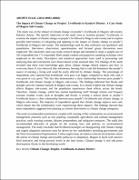| dc.description.abstract | AROPET ISAAC (2014-M092-40002)
The Impact of Climate Change on Peoples’ Livelihoods in Katakwi District: A Case Study of Magoro Sub-County.
The study was on the impact of climate change on people‟s livelihoods in Magoro sub-county, Katakwi district. The specific objectives of the study were to examine peoples‟ livelihoods, to examine the impact of climate change on people‟s livelihood in Magoro sub-county and to explore possible interventions of mitigating and adapting to the impact of climate change on people‟s livelihoods in Magoro sub-county. The methodology used for data collection was qualitative and quantitative. Interviews, observation, questionnaires and focused group discussions were employed. The researcher used case study research design and intended to study a sample size of 185 respondents but 172 responded. Both simple random and purposive sampling technique were employed in the study. Descriptive and statistical approaches were used in processing and analysing data and conclusions were drawn based on the analysed data. The findings of the study revealed that there were knowledge gaps about climate change related impacts and how to overcome them. It was observed that subsistence farming that is rain fed dominates the people‟s source of earning a living and could be easily affected by climate change. The percentage of respondents who reported that livelihoods were poor was bigger compared to those who said it was good or very good. This fact also demonstrates a clear relationship between poor people‟s livelihoods and climate change in Magoro sub-county. The findings indicated that floods and draught were the common hazards in Magoro sub-county. It is clearly evident that climate change affects Magoro sub-county and the population experiences these effects across the board. Therefore, climate change, which has started manifesting itself through intense and frequent extreme weather events such as droughts and floods, is posing a serious threat to people‟s livelihoods hence a clear relationship between poor people‟s livelihoods and climate change in Magoro sub-county. The majority of respondents agreed that climate change impacts were real, which meant that the communities were experiencing these impacts. The findings showed that most respondents suggested tree planting as a better intervention to climate change mitigation.
The study recommended sensitisation coupled with training of the communities on environmental management practices such as tree planting, sustainable agricultural and wetland management practices, early warning systems, disaster preparedness and mitigation measures. The study also recommended education of people on the existing laws and policies on environmental management. The study concludes that livelihood strategies are disappearing with climate change and urgent adaptation measures must be driven by key stakeholders including governments and the Non-Governmental Organisations. Unless urgent steps are taken to educate local farmers about the notion of climate change and possible pathways to adaptation, Magoro is faced with massive food insecurity and rising poverty levels in the near future. Climate change is real and poses development threats to the developing world.
Key Words: Climate Change, Peoples, Livelihoods, Katakwi District. | en_US |


